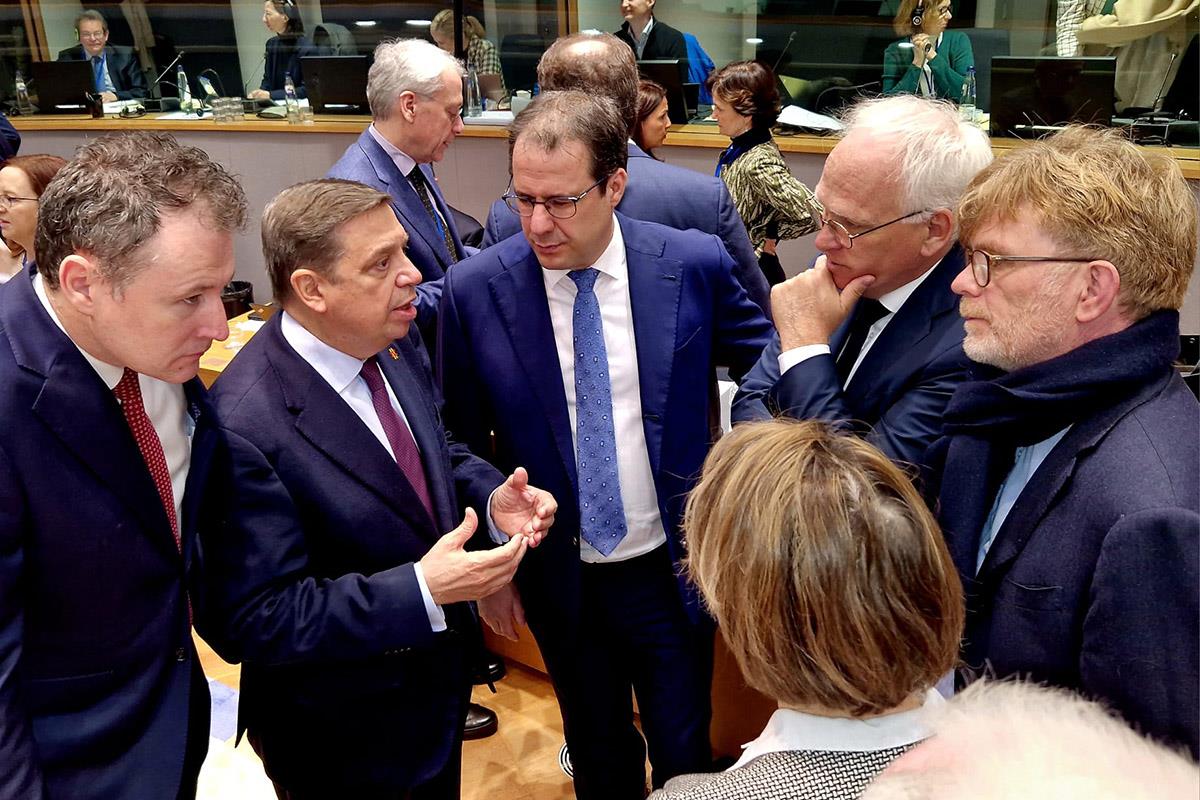Spain appreciates the progress made by the EU Council of Ministers in responding to the simplification and flexibility demanded by the agricultural sector
News - 2024.2.26
 The Minister for Agriculture, Fisheries and Food, Luis Planas, attends the Council of Agriculture and Fisheries Ministers of the European Union in Brussels
The Minister for Agriculture, Fisheries and Food, Luis Planas, attends the Council of Agriculture and Fisheries Ministers of the European Union in Brussels
The Minister for Agriculture, Fisheries and Food, Luis Planas, today assessed the progress made by the Council of Agriculture and Fisheries Ministers of the EU in responding to the simplification and flexibility of the Common Agricultural Policy (CAP), pressing the point that "a European solution must be found to a European problem and a European challenge".
The minister thanked the European Commission (EC) for its proposals, which include a many of the Spanish measures. The EC's simplification measures "are in the right direction to resolve issues of concern, such as the excessive requirements of enhanced cross-compliance, the complexity of aspects such as geo-referenced photos and the need for the food chain to function properly", Planas explained.
To this effect, among the measures to do with simplifying the presentation of CAP applications, he highlighted the elimination of cross-compliance controls due to the high bureaucratic burden this places on farms with less than 10 hectares of land. This measure has a major impact in the case of Spain, as it benefits 345,000 farmers, 55% of all CAP recipients.
Spain has proposed in the Council that to alleviate the problems posed by enhanced cross-compliance, the rules on crop rotation and set-aside should also be repealed for the 2024 marketing year, and the evaluation and yield reports simplified.
The EC has understood the need to make more flexible the Good Agricultural and Environmental Conditions (GAEC) numbers 6 (minimum vegetation cover to avoid bare soil in the most sensitive periods), 7 (crop rotation) and 8 (a minimum percentage of the agricultural area to be set aside for non-productive areas).
In line with the bureaucratic simplification of the CAP, Spain and other EU countries have requested that the requirement for geo-referenced photos is also simplified, as they represent a significant burden for producers.
Aside from this assessment, the minister considered that greater speed is required in the application of the measures, especially those that require a modification of the basic regulations, given that the European legislature is about to come to an end with elections to the Parliament to be held between 6 and 9 June. He recalled that farmers and stockbreeders are waiting for urgent solutions.
The minister pointed out that the reopening of the basic regulation should also involve a reflection on the changes to be made to a CAP that was designed in a very different context to the present one in which it has to be applied, with farmers and stockbreeders very affected by the increase in costs and other difficulties derived from the war in Ukraine and the effects of climate change, which is particularly sensitive in Spain.
Europe's great pact for agriculture and the rural environment
The minister has raised the need for a new great European pact for agriculture and the rural environment as the best way to respond to the concerns of farmers and stockbreeders, who have been mobilising in recent weeks in different member states. "We are facing a major European challenge that requires a major European response," he said.
The minister explained that this great pact to place agriculture at the forefront of the EU debate must update the five basic principles set out in the founding treaty of the Common Agricultural Policy 60 years ago. Farmers and stockbreeders, Planas explained, see the new CAP as an additional difficulty and not a solution, which is why he considers it necessary to make every effort to ensure that the EU provides a real response to the needs of the primary sector.
Dialogue with European farmers and breeders
The minister once again appealed to the need for dialogue between European institutions and farmers and stockbreeders, so that they "understand, comprehend and support the transformation process we are carrying out" and do not perceive it as a burden, but as a solution.
The minister pointed out that the fight against climate change, the preservation of biodiversity and the profitability of farms are positive elements, especially for agricultural activity, which is suffering the consequences of climatic adversities, "but we must carry out these actions hand in hand with farmers and livestock breeders".
The five founding objectives of the CAP are to increase agricultural productivity and ensure a fair standard of living for farmers, the stabilisation of markets, security of food supply and reasonable prices for consumers.
Luis Planas has brought two other fundamental issues to the Council in response to the sector's concerns: the proper functioning of the food chain so that all links in the chain are adequately remunerated, and the creation of formulas so that food imports are subject to the same requirements that European producers are obliged to comply with.
With regard to the directive on unfair commercial practices, he welcomed the fact that an amending document had been presented to include the prohibition of sales at a loss, as appears in the Spanish food chain law. "We think it is important that the EC announces that it intends to introduce legislation in this respect in the next legislature. The Spanish chain law has been a formidable leap. Now we need another one at European level," he stressed.
With regard to imports from third countries, he reiterated that Spain will defend the mirror clauses so that products that are not authorised in the EU cannot be used there. Spain was one of the pioneers in requesting their implementation some years ago, and the minister reiterated that when "the demand is fair and we have arguments, as in this case, then we must be consistent before the EU institutions".
Non official translation




